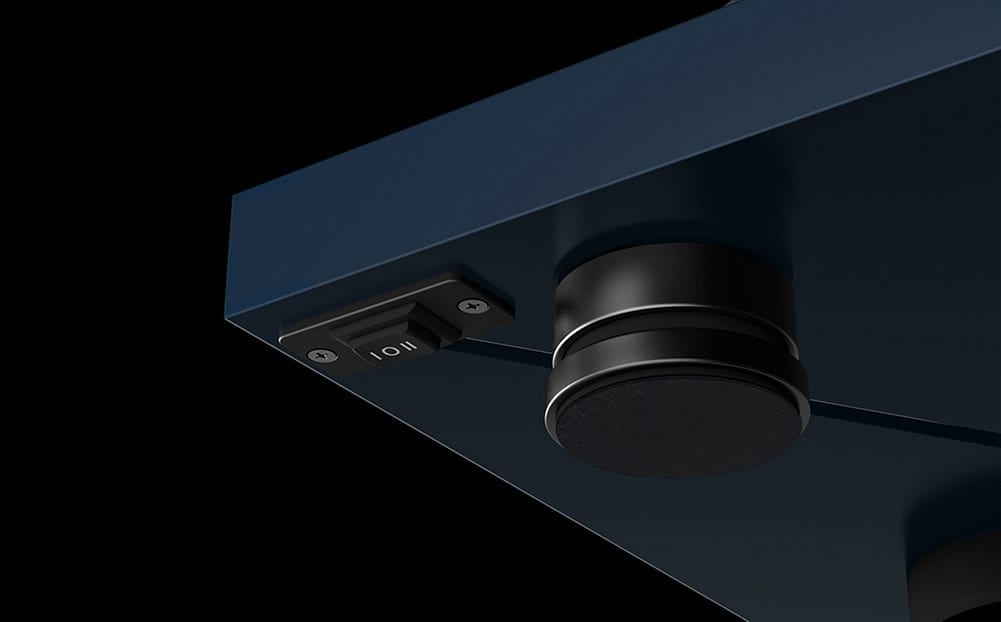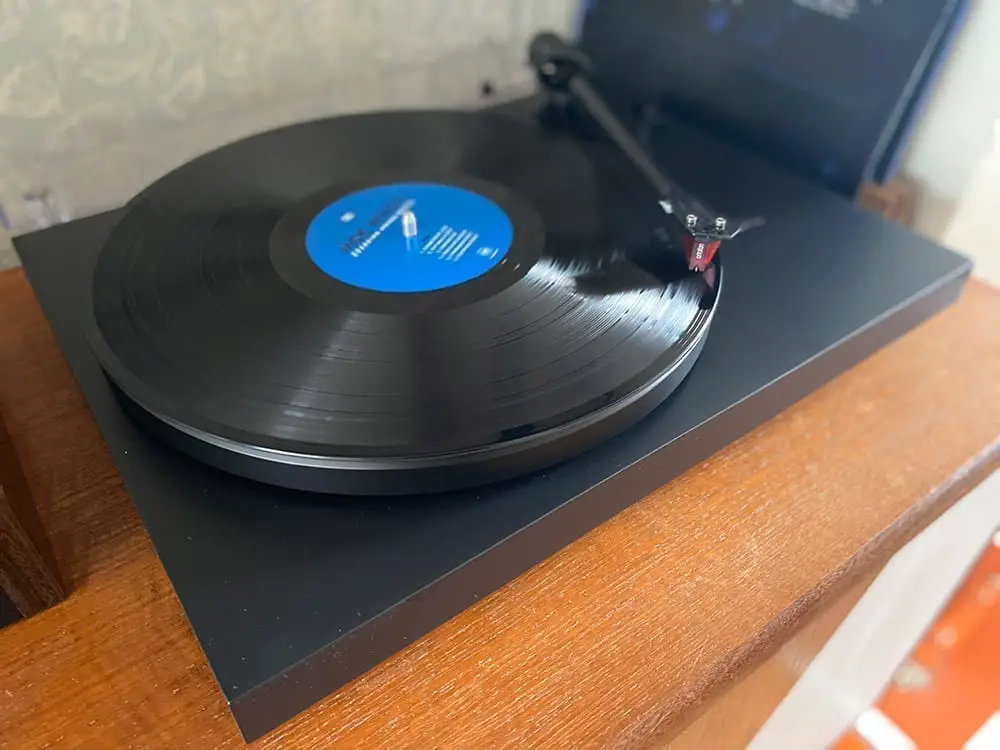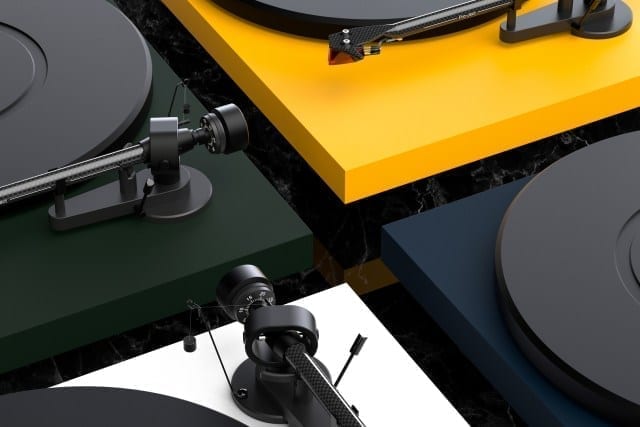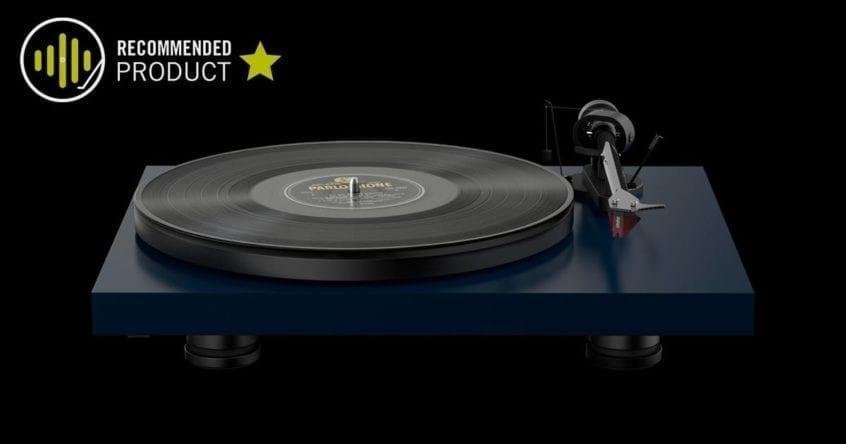The Debut Carbon we all know and love, with just a little extra class and sophistication. What’s not to like? We explore the latest addition to Pro-Ject’s prominent entry-level turntable range.
The Debut Carbon DC is admired across the vinyl community as a minimalist deck that nails all the essentials. For many, it still represents the standard in what it takes to manufacture a deck with a dynamic and engaging sound without breaking the bank. As a self-proclaimed fan of the Debut Carbon myself, I was excited to learn of a newcomer to the Debut family.

As the name suggests, the new Debut Carbon Evo builds on the Debut line’s core principles, bringing new features and improved components in the name of taking performance levels to new heights.
This is not the first time Pro-Ject have tweaked or extended the range of course. The original Debut turntable was first introduced in the late 90s and quickly gained traction as a great sounding affordable deck. Since then, the range has continued to evolve, with upgraded materials and manufacturing processes. Looking back, the first Debut turntable resembles the company’s present-day Primary E range (a newer, stripped back range from Pro-Ject). Undoubtedly, the present-day Debut offers greater value for money than ever, so what does its new relative bring to the table?
Improved motor suspension
The Evo is said to improve on the already great TPE damped motor suspension. According to Pro-Ject, “We have improved the old design to consistently reduce the vibrations better than before.”
TPE Damped Platter and Feet
Continuing with the improvement to resonance control, the Evo adds TPE damping to the metal platter and comes equipped with three height-adjustable damped aluminum feet.
Motor Control
Lastly, and perhaps most significantly, the new Evo allows you to change between 33, 45, and 78 RPM using a single rocker switch. Not only can you now play your old 78s, but you can switch speeds without having to remove the platter and manually move the drive belt.
Admittedly, switching to 78 RPM does involve a little more work in removing the platter and swapping the primary flat drive-belt for the second, round drive-belt. The round belt fits around the larger diameter part of the motor pulley. However, when you consider that playing 78s requires a cartridge and stylus change anyway, this isn’t such a big deal.

Elements of Continuity
The classic 8.6″ carbon tonearm remains and comes pre-fitted with the popular Ortofon 2M Red (or a Sumiko Rainier if you’re buying in the US).
The Evo retains much of the simplicity we all know and love, but the performance and user experience step up an extra notch. There’s an additional feeling of sophistication with the latest Debut; helped, of course, by the additional upgrades, but enhanced further, in my opinion, by the new satin-finish colors.
As always with a Debut turntable, you can easily make some user upgrades, including the addition of an acrylic platter or a simple stylus change for the Ortofon 2M Blue. In my experience, both changes make a profound difference.
How Does it Sound?
For the listening test, I pulled out a selection of records that I know intimately, as this enables me to draw a better comparison. First up on the platter was a 45 RPM pressing of Counting Crows, August and Everything After. I know this record inside out, and I’ve always admired the balanced mix and dynamics. On the Debut Carbon Evo, the performance is immediately engaging with a strong, solid bass and crisp high top-end. The instrument separation is just like you’d expect from a debut, only arguably the Evo is a tad more focused – perhaps due to the additional TPE damping.

Next on my list was the ubiquitous Fleetwood Mac Rumours. Again, another superbly crafted and produced album. On the opening track, Second Hand News, I could easily pick out the individual harmonies and guitar overdubs across the stereo spectrum. The drums are punchy and crisp, with a signature 70s dry snare sound. The Evo’s tight low-frequency performance really shines through on this record, particularly when the rhythm section works very closely together, such as on tracks like Dreams, for example. A classic album deserves a stellar rendition, the Evo delivers.
Bringing us into the 21st century, Alt-J’s Relaxer steps up as the third record. The sonic offering is much broader on this record, helping to test the Evos capability to deliver the rich tones of synthesizers mixed with a guitar-based band. The Evos mid-range competence was immediately apparent here, and there is a wealth of depth for a deck at this price point. For under a turntable in the under $500 (£450) bracket, it’s an impressive offering that stands up to anything else on the market.
Conclusion
Having tested the Evo with both 33 and 45 RPM records, I’m immediately grateful for the addition of speed control, and I must say, I really dig the satin finish on this deck. The version I tested came in black, but there is also a range of charming modern colors on offer alongside the usual high-gloss and wood finishes. The Satin Steel Blue looks particularly sharp.

I regard the original Debut Carbon as a modern classic and the embodiment of how to produce an audiophile deck without breaking the bank. On this account, the new Evo stands on solid ground, and easily makes our list of the best turntables on the market. It’s everything we love about the Debut, but just a little more grown-up.
In particular, features like motor speed control bring the Debut line closer to its bigger brother, the X1 (a turntable that I personally own). And while the Evo does cost more than a Debut Carbon DC, you’ll thank yourself for saving those extra pennies in the long run. The Evo is a deck that could easily find a place in your listening space for a lifetime; consider this the Debut’s coming of age.









Hello Marc, thank you for your very nice review ! I have the same question as Andy, between the Evo and the X1, which one would you recommend ? Would it be for instance a good choice to go with the Evo, and use the rest of the budget to upgrade the cartridge or something else ? Thank you !
Hi Martin. It all comes down to a balance of flexibility and budget. The X1 is more upgradable in that it has full VTA adjustment for a wider range of cartridges. Plus it comes stock with the acrylic platter, a more substantial base, and a TPE-damped counterweight.
However, if you plan to upgrade the cartridge to another one from the Ortofon range, then you shouldn’t need to adjust VTA anyway and the Evo will be very compatible.
If you can stretch to the X1, great. But that said, the new Evo does close the gap between a Debut Carbon and the X1 significantly. Hope this helps.
Thank you for your answer ! Cheers from Belgium !
Great review Marc, I love my Debut Evo, anyone in Europe who buys this should immediately upgrade to a 2m Blue really makes it sound fantastic, I see you are a X1 owner how much better do you think the X1 sounds over the Evo?
I’m so sorry Andy. Martin (comment below) just alerted me to your question that I must have missed back when this was published.
As I say to Martin, it all comes down to a balance of flexibility and budget. The X1 is more upgradable in that it has full VTA adjustment for a wider range of cartridges. Plus it comes stock with the acrylic platter, a more substantial base, and a TPE-damped counterweight.
If you can stretch to the X1, great. But that said, the new Evo does close the gap between a Debut Carbon and the X1 significantly. Hope this helps.